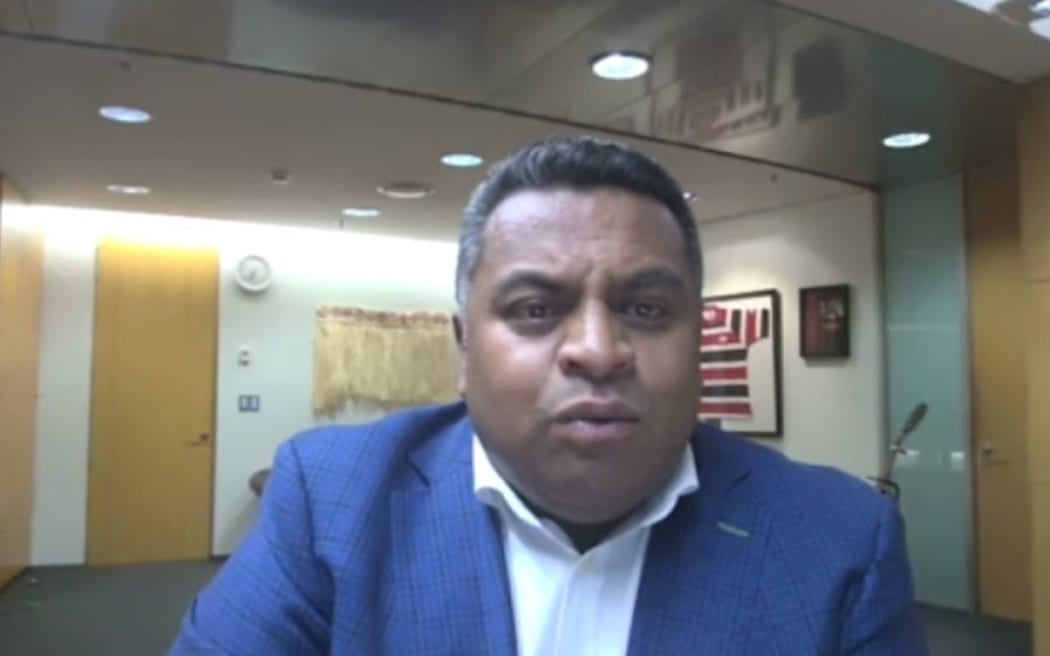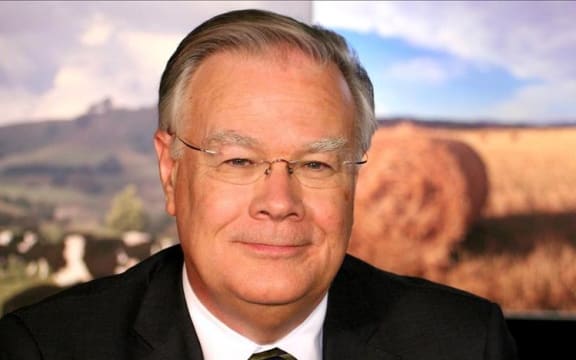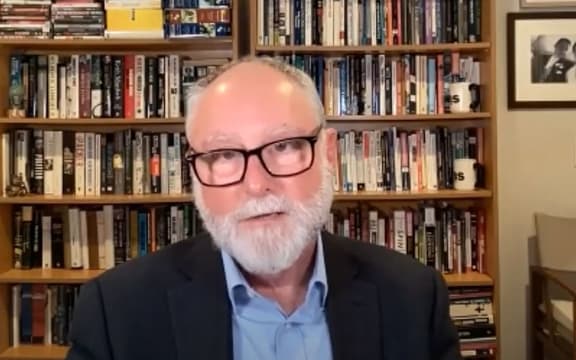The government’s planned new Public Media Entity - backed with $109m a year in last week's Budget - was debated in a virtual meeting this week. But beyond expanded public funding for three years, little more is known about how it will be run, by whom and what it will produce.

The minister of broadcasting and media Kris Faafoi delivers the David Beatson Lecture via Zoom during a debate on public broadcasting arranged by the Better Public Media Trust on May 24 2022. Photo: RNZ Mediawatch
Five years ago, former broadcaster and editor and public broadcasting advocate David Beatson - whose health was failing at the time - said his “last fight” was for better broadcasting.
“I believe that the current broadcasting model is probably on its knees. I want to see the resources that we have rejigged so that we can have a non-commercial free to air television system, which Radio NZ should be involved with. I am lobbying like hell. I'll get it. To hell with it,” he said in a NZ On Screen interview about his life and times.
David Beatson didn't get what wanted before he died later that year. But five years on one state-owned entity offering radio and TV is the current government’s plan - with a mix of commercial revenue and public funding.
Budget 2022 earmarked an additional $327m over three years for that last week - and Broadcasting and Media Minister Kris Faafoi committed to funding around half of its annual operating costs - around $200m a year - until 2026.
The plan is to have that new Public Media Entity (PME) up and running in little over a year from now but details are still thin on the ground.
The minister has also guaranteed all existing non-commerical services - such as RNZ National, Concert and Pacific - will still be provided.
But how the new autonomous crown entity will run, who will run it and exactly what else it will do are yet to be determined by a recently-appointed ‘Establishment Board’
This week Kris Faafoi did front up in an online forum by campaign group the Better Public Media Trust - in which he also delivered its annual address in memory of David Beatson.

David Beatson Photo: NZ On Screen
Faafoi said better-funded public media would be good for journalism and democracy - and he said he hoped David Beatson would have approved of what he’s now doing.
David Beatson Memorial Address 2022 delivered by Minister of Broadcasting and Media Kris Faafoi
But the rest of the address and the Q and A that followed was mostly a restatement of commitments made so far - and of his belief that RNZ and TVNZ of today are out of time.
“(They were) set up for a different world of traditional radio and television. Within the constraints of the existing legislation they've done what they can do to change to modernise ... and this makes me optimistic about what we can achieve for public media when we have an entity with modern enabling legislation, consistent focus, flexibility and a structure and funding to nurture content and feed audiences,” he said. That modern legislation Faafoi spoke of will have to be tabled within a couple of months - and he insisted the public will have a chance to comment on it soon.
But - like most of PME plan so far - that’s being done behind closed doors.
On his blog Knightly News this week the former New Zealand Herald editor-in-chief Gavin Ellis said the public deserved to have a much clearer picture before three years of funding was committed to something due to be up and running in little more than a year.
“The Establishment Board tasked with filling in the details will be circumscribed by that legislation, which must be well-advanced by now,” he wrote.
“Either these foundational underpinnings preordain the structure - or the timetable requires the new entity to be established in such haste that it will be a mechanical exercise of fitting existing pieces together.
"Either way, we may wind up with nothing more than a merger that amounts to a back-to-the-future version of the NZBC - or the two public broadcasters will be rearranged into a piece of eccentric architecture combining Radio New Zealand House on The Terrace and the TVNZ Television Centre on Victoria Street West," he wrote.
(... not to mention all the other premises and bureaux dotted around the country serving the two broadcasters, Gavin Ellis could have added.)
Another question unanswered so far: what’s the role of the government broadcasting funding agency NZ on Air (NZOA), currently the conduit for the bulk of public money for our public media?
“Those kinds of decisions are still going to be worked through. We don't want both of those entities. Funding the same kinds of content,” the minster replied when asked if NZOA would fund programmes and content for the new PME as it has for TVNZ in the past.
The minister went on to say NZOA added healthy “competitive tension” to local content - and it would have to work out how to co-exist appropriately with the new PME.
But that adds no clarity to a matter that must have been considered by the Ministry for Culture and Heritage which monitors public media funding and performance; or those working on the legislation underpinning the PME; or the expert advisory group appointed to draft the charter and scrutinise the business case demanded by Cabinet or at least one of the groups of consultants which contributed to that business case.
It also means no-one knows exactly how much money will really be available to the new PME - or for the creation of local content across all media.
The Zoom link to the minister in his Beehive office failed while he answered questions about oversight of the PME and commitments to children - and he didn't return.

Dr Gavin Ellis outlining his concerns about the creation of a new Public Media Entity at a virtual meeting run by the Better Public Media Trust on 24 May 2022. Photo: screenshot / YouTube
During a panel discussion that followed, Dr Gavin Ellis said the new PME was a good idea whose time came some time ago, but the process was the problem.
“I have no idea what the structure of this entity is going to be like, I fear that it's going to have two divisions that will have different names, but in fact will be Radio New Zealand, and Television New Zealand. If it does that it's failed,” he said.
“This entity will also be monitored by more state agencies than ever before. This is at a time when trust in media and trust in government is at an all time low. If we don't do something to ensure the absolute independence of this entity ... then it will not gain the trust of the public," he said.
While the minister had spoken of a PME fit for the future that will even deliver for the children of tomorrow - what happens after 2026 when the current funding commitment ends?
And what would happen after 2023 if the government changes soon after the new PME is created?
“No government can bind the hands of a future government. You can only do your best to make sure that everybody understands that this is a good idea, and also to bring the public with you so that it's politically not a good idea to muck around with it,” said the chair of the PME establishment board Tracey Martin.
But some opponents will take some convincing.
National Party broadcasting spokesperson Melissa Lee complained she had been cut out of the process.
Back in March Melissa Lee told Mediawatch her party didn’t support the merger of RNZ and TVNZ but wouldn’t waste money “unpicking it”. She said so again in last Tuesday’s debate, but 12 hours later on RNZ’s Morning Report, her party leader Christopher Luxon said he would put the PME funding back in the public purse.
“(I've got) no interest in doing a merger of RNZ and TVNZ. The government has no idea why it's doing it. For what benefit, for what outcome? You're saying that's one of the most important things you're going to do right here right now, in the middle of a cost of living crisis?” he asked RNZ’s Susie Ferguson.
Earlier in his David Beatson memorial address, Kris Faafoi said that better public media was a public good for which the public should pay.
But there’s clearly not a consensus on that among the opposition politicians who could strangle the government's Strong Public Media programme, or the vocal critics claiming it could become an instrument for government influence.
The clock is ticking on this effort to build something that will take the public with it - and political opponents.

